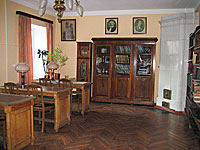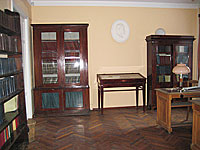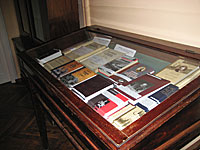Exhibition at the Plekhanov House
The small exhibition entitled "Russia at the Turning Point . Recollections, Thoughts, Evaluations. Looking from Abroad" opened at the reading room of the Plekhanov House under the motto 'Follow those who are seeking the truth, but run away from those who have found it' . The display uncovers another side of socio-political history of this country during the last century.
In 2005, the 7th Plekhanov Readings "Russia in the Early 20th Century: Entering into the Era of Historic Change" launched a series of conferences which aimed to explore the causes and nature of radical transformations, including those of the revolutionary character, through which the Russian society had to go during the last century.
Of particular interest to those studying the revolutionary events of the early 20th century are first-hand testimonies from the people directly involved. And while the documents and memoirs of members of the Bolshevik Party were widely available to researchers, access to the materials of their opponents, issued abroad or kept in special depositories, was limited. Today, many publishers turned to previously inaccessible materials. Among them, it is worth drawing attention to the memories and documentary sources, the authors of which were emigrants in the so-called "first wave". As the witnesses and participants in the revolutionary events of 1917 and the Civil War, forced to emigrate from Russia for various reasons, they got the opportunity to contemplate and give their own interpretation of the years amounting to an entire era, watching the changes taking place in Russia "from the other side." Despite ideological passion and bias and some gaps in recollection, memoirs of the authors presented at the exhibition are the most valuable evidence of history and will be of interest to a wider audience.
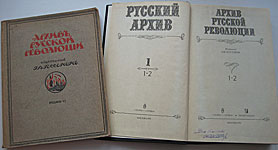 Archives of the Russian Revolution. Vol. 6. Berlin: Slovo, 1922. 364 pp.
Archives of the Russian Revolution. Vol. 6. Berlin: Slovo, 1922. 364 pp.
Particularly notable in this volume are the memories The State Duma and the February Revolution by Mikhail Rodzianko and The Last Report to His Imperial Majesty composed by him. Rodzianko was a deputy of the State Duma of the Russian Empire, who headed the Provisional Committee of the State Duma in the days of the February Revolution. In addition to the sixth volume, the library of the Plekhanov House also possesses the seventh, ninth and tenth volumes of the Berlin edition, all of them were returned from the Spetskhran (an abbreviation for "Special Storage Section") in 1990.
Archives of the Russian Revolution. Vol. 1 - 2. Moscow: Publishing Centre Terra; Politizdat, 1991. 312 pp, 227 pp. Reprinted.
Here, attention should be paid to Vladimir Nabokov's memories The Provisional Government, written in August 1918. Archives of the Russian Revolution is a unique publication, issued in Berlin in 1920 - 1930. It includes memories and documents of the era of revolution and civil war (1917-1921), the first years of exile of the political forces opposing the Bolsheviks and the Soviets. The publisher of the Archives was Joseph Gessen (1865 - 1943), a member of the Central Committee of the Constitutional Democrat Party (Kadets), a deputy of the Second Duma of the Russian Empire. While living in exile in Berlin, he along with Vladimir Nabokov (1869 - 1922) headed the publishing house Slovo (Word) which published the Archive. In 1991 - 1993, the entire series was reprinted in Moscow.
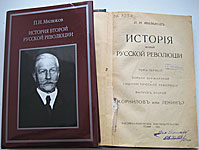 P.N.Milyukov The History of the Second Russian Revolution. Vol. 1. Sofia: Russian-Bulgarian publisher, 1921. 292 pp.
The book was returned to the Plekhanov House from the Spetskhran (an abbreviation for "Special Storage Section") in 1990.
P.N.Milyukov The History of the Second Russian Revolution. Vol. 1. Sofia: Russian-Bulgarian publisher, 1921. 292 pp.
The book was returned to the Plekhanov House from the Spetskhran (an abbreviation for "Special Storage Section") in 1990.
P.N.Milyukov The History of the Second Russian Revolution. Moscow: ROSSPEN, 2001. 767 pp.
The book by the Russian prominent historian, political and public figure Milyukov (1859 - 1943) is devoted to a multidimensional study of the February Revolution of 1917.
The publication has research reference information. In the introduction, the member of the Russion Academy of the Science V.V. Shelokhaev states that "the book by Milyukov, first reissued in this country, will make its mission as a bonding agent to attach two pieces of artificially torn fabric of the single historical and cultural space, it will be an important source for the study of one of the most dramatic periods in Russian history" .
The exhibition features two editions of this book.
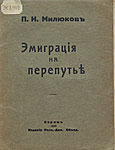
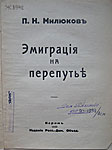 P.N.Milyukov Emigration at a Crossroads. Paris: Publishing House of the Republican Democratic Association, 1926. 137 pp.
P.N.Milyukov Emigration at a Crossroads. Paris: Publishing House of the Republican Democratic Association, 1926. 137 pp.
Besides the exhibited publications by Milyukov, the Memorial Library of the Plekhanov House houses this book returned from the Spetskhran (an abbreviation for "Special Storage Section") in 1990. In this work, the author analyzes political emigrants' opinions and intentions of finding "ways of the liberation of the motherland" and the possibility of returning. Political season of 1925 - 1926 acutely raised a question to the emigration: how to return home. Miliukov wrotes, 'The Right made a desperate attempt to freshen up an old project to return home by means of military force, by an immediate armed attack from outside using foreign intervention. ... The extreme left wingers tried to contrast that with the idea of - too immediate - peaceful home-coming by agreement with the Soviets. ...
If the analysis, produced by the author, helps expatriates, at this moment of the radical crisis they are going through, to better understand the contradictory aspirations and choose among them a right way, the purpose of brochures will be achieved. "
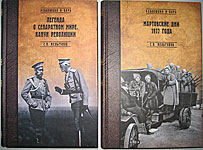 S.P. Melgunov The Revolution and Tsar: The Trilogy. Moscow: Veche, 2006.
S.P. Melgunov The Revolution and Tsar: The Trilogy. Moscow: Veche, 2006.
Vol. 1. The Legend of a Separate Peace. The Eve of the Revolution. 624 pp.
Vol. 2. Days of March 1917. 576 pp.
The exhibition shows the first two volumes of the work of the historian Sergei Melgunov (1879 - 1956) first published in Russia. They are devoted to the disclosure of the confrontation of political forces that led the country to the February Revolution. The historian worked on the first volume during the Second World War (1939-1945). In the summer of 1955, the manuscript was undergone a further revision and correction by the author and first appeared in print after two years. Work on the second book was finished during the war. Then, one of its fragments was published in the emigre newspaper Vozrozhdenie (Revival) from 1950 to 1954. The complete book was published in Paris in 1961. It offers detailed examination of a wide range of sources which become available to the historian. To reconstruct the chronology of events of the February Revolution, Melgunov not only studied the huge amount of published documents and memoirs, but also personally interviewed dozens of participants of events, starting this work even in Russia, prior to his deportation in 1922.

